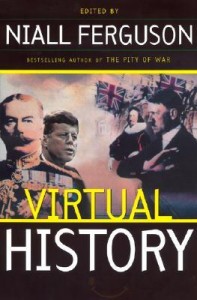Short Fuse: What If(s)?
Counterfactual thinking came to my mind while watching a documentary about the Kennedy clan that ran on public television after Ted Kennedy died.
By Harvey Blume
 When Niall Ferguson is not slugging it out with Paul Krugman about whether deficit spending by the Obama administration will wreck the economy, as he swears it will, or rescue it, as Krugman more persuasively maintains, the British historian does some provocative theorizing about what goes by the name of counterfactual history. (See, for example, “Virtual History: Alternatives and Counterfactuals,” edited and introduced by Ferguson).
When Niall Ferguson is not slugging it out with Paul Krugman about whether deficit spending by the Obama administration will wreck the economy, as he swears it will, or rescue it, as Krugman more persuasively maintains, the British historian does some provocative theorizing about what goes by the name of counterfactual history. (See, for example, “Virtual History: Alternatives and Counterfactuals,” edited and introduced by Ferguson).
History, for Ferguson, is what happened. It is not what had to happen. Alternative scenarios present themselves, and in fact abound, at every turn. Ferguson, an Oxford and Harvard don, likes to endow his counterfactuals with a certain academic gravitas. He is not interested in counter histories that involve Martians landing in Yankee Stadium, or Gandalf scaring off the Taliban, or, for that matter, Kublai Khan hunting for walrus in the Arctic. More worthy of consideration for Ferguson would be, say, John Wilkes Booth’s gun jamming and Lincoln completing a second term, or Hitler directing the entire Wermacht at England rather than smashing it on the eastern front.
For Ferguson, the opposing view, the notion that history is strictly determined, that what happened is the one and only thing that can have happened, is an arid fallacy especially rife among though not limited to Marxist historians. Psychology and neurology corroborate Ferguson’s view. The ability to weigh consequences and think through alternatives is considered a sign of mental health, whereas to experience one’s actions as dictated or inevitable points to pathology.
Counterfactual thinking came to my mind while watching a documentary about the Kennedy clan that ran on public television after Ted Kennedy died. Two nodes of the story seemed packed with counterfactual punch.
![]() First: JFK famously overruled his military advisors during the Cuban Missile Crisis. What would have happened if, instead of negotiating with Khrushchev, he had listened to the Joint Chiefs of Staff and authorized a preemptive strike on Cuba?
First: JFK famously overruled his military advisors during the Cuban Missile Crisis. What would have happened if, instead of negotiating with Khrushchev, he had listened to the Joint Chiefs of Staff and authorized a preemptive strike on Cuba?
Second: After Kennedy was killed, his successor stood at a momentous crossroads. What would have happened if LBJ has refused futile and brutal escalations in Vietnam, and instead committed America’s energies toward fulfilling the deeply humane ambitions set forth in the domestic agenda of the Great Society?
The first counterfactual has received no lack of attention. Post nuclear holocaust scenarios are a staple of film and fiction.
Why has the second, far brighter, counterfactual kindled few if any literary imaginations and found no takers among film makers?
Tagged: John Kennedy, Kennedys, Niall-Ferguson, Short Fuse, Ted Kennedy, counterfactual
